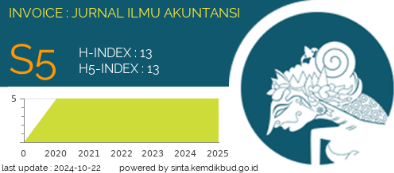The Effect of Implementation of Government Accounting Standards and Internal Control System on The Quality of Financial Statements of Disdukcatpil District Langkat
Abstract
Full Text:
PDFReferences
Emka, B. (2006). Auditing Pedoman Pemeriksaaan Akuntansi. STIE Inaba.
Harmono. (2009). Manajemen Keuangan Berbasis Balanced Scorecard Pendekatan Teori, Kasus dan Riset Bisnis. Bumi Aksara.
Muhammad. (2016). Manajemen Pembiayaan Bank Syariah. UPP STIM YKPN.
Murhadi, W. R. (2013). Analisis Laporan Keuangan Proyeksi dan Valuasi Saham. Salemba Empat.
Marsuni, N. S. (2019). PENGARUH PRAKTIK ISLAMIC CORPORATE SOCIAL RESPONSIBILTY (I-CSR) TERHADAP KINERJA KEUANGAN PADA BANK UMUM SYARIAH PERIODE 2014-2018.
Marsuni, N. S., & Rismawati, R. (2018). INCOME AND COST ANALYSIS OF BUSINESS ACTIVITIES DEVELOPMENT AT THE BUSINESS DEVELOPMENT CENTER (P2B) STATE ISLAMIC UNIVERSITY OF MAKASSAR. Jurnal Ekonomi Balance, 14(1), 129-136.Pohan, A. (2008). Kerangka Kebijakan Moneter dan Implementasinya di Indonesia. PT. Raja Grafindo Persada.
Siregar, Y. P. (2020). KINERJA DINAS KEPENDUDUKAN DAN PENCATATAN SIPIL DALAM PELAYANAN PUBLIK DI KABUPATEN LANGKAT. Universitas Sumatera Utara.
Soemitra, A. (2017). Bank dan Lembaga Keuangan Syariah. Kencana.
Sulhan dan Elly Siswanto. (2008). Manajemen Bank Konvensional dan Syariah. UIN Malang Press.
DOI: https://doi.org/10.26618/inv.v4i2.8991
Refbacks
- There are currently no refbacks.
Invoice : Jurnal Ilmu Akuntansi Is Licenced Under a Creative Commons Attribution-Noncommercial-Noderivatives 4.0 International License










